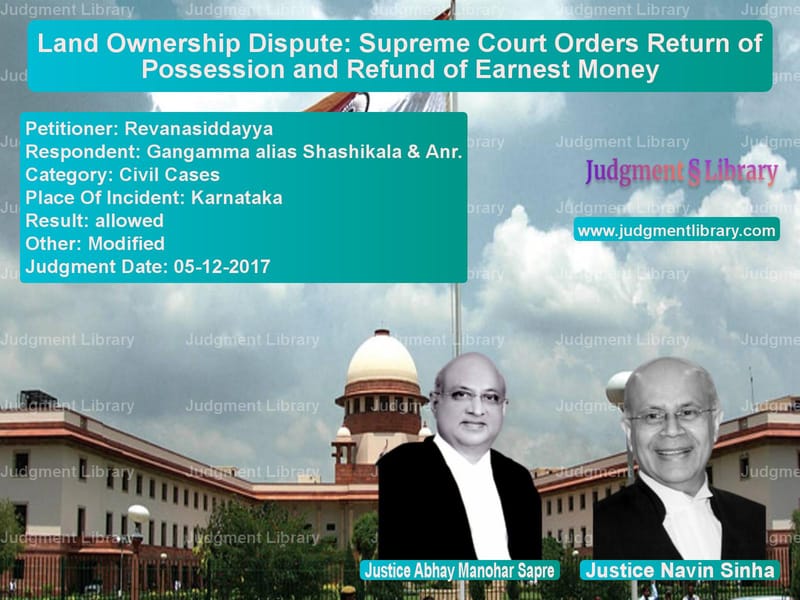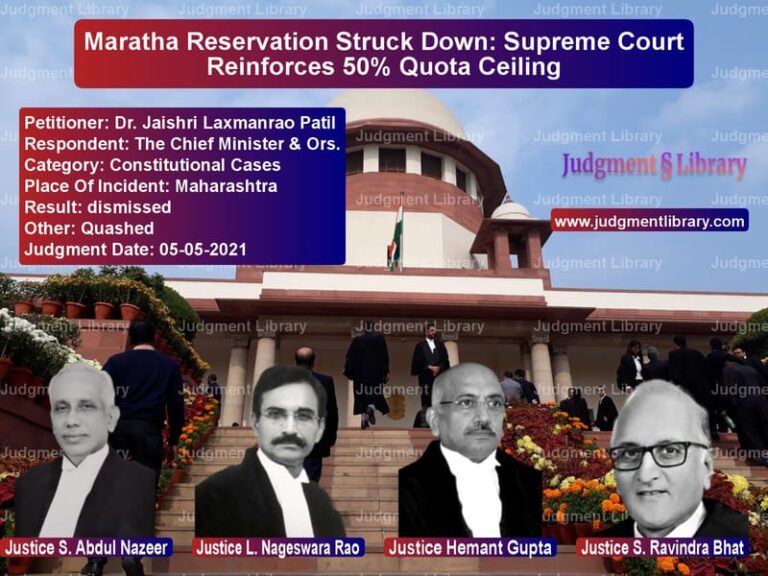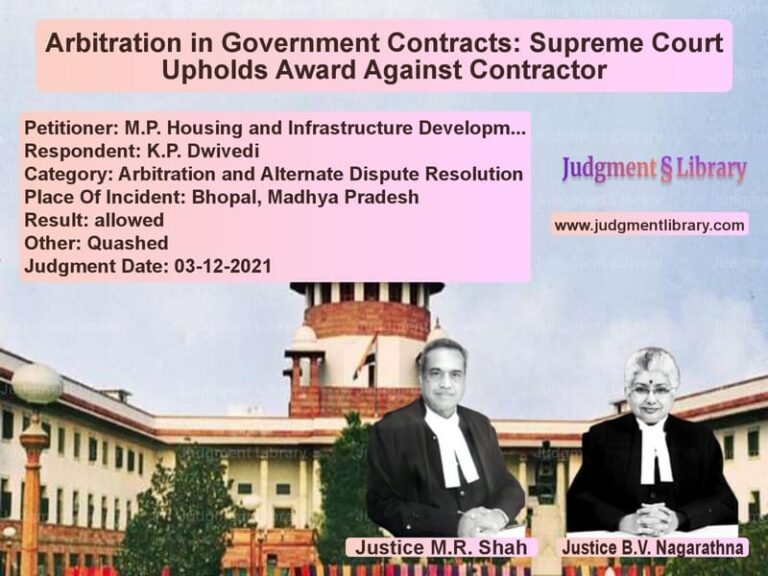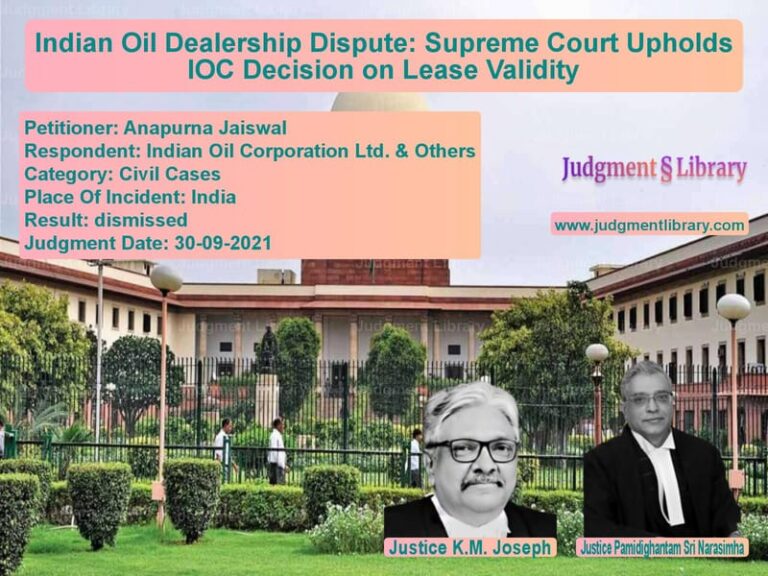Land Ownership Dispute: Supreme Court Orders Return of Possession and Refund of Earnest Money
The Supreme Court of India recently ruled on a long-pending land ownership dispute between Revanasiddayya (appellant) and Gangamma alias Shashikala & Anr. (respondents). The case revolved around an agreement for sale of agricultural land, possession rights, and the rights of legal heirs after the original owner’s death.
Background of the Case
The dispute pertained to agricultural land situated in Karnataka, owned by the respondents’ late father, Veerabasayya. On 06.11.1986, Veerabasayya entered into an agreement to sell the land to the appellant for Rs. 1,75,000. The appellant paid Rs. 1,00,000 as earnest money and was placed in possession of the land, with the remaining amount to be paid upon execution of the sale deed within three months.
However, before the sale could be completed, Veerabasayya passed away on 06.08.1988. His legal heirs (the respondents) inherited the property and subsequently filed a suit seeking a declaration of ownership and possession of the suit land from the appellant.
Trial Court Decision
The Trial Court, in its judgment dated 09.02.2000, held that the respondents were the legal owners of the land but refused to grant them possession. The court ruled that since the appellant was placed in possession under the agreement, he could not be evicted unless his rights under Section 53-A of the Transfer of Property Act, 1882, were considered.
Subsequent Legal Proceedings
- In 2000, after the respondents’ suit was decided, the appellant filed a separate suit (O.S. No. 153/2000) seeking specific performance of the agreement.
- In 2009, the Trial Court dismissed the appellant’s specific performance suit.
- The appellant’s appeal was also dismissed by the District & Sessions Judge in 2012.
- The appellant did not pursue further appeals.
High Court Decision
The respondents filed a first appeal (RFA No. 242/2004) before the Karnataka High Court, challenging the Trial Court’s decision denying possession of the land. The appellant did not file a cross-appeal challenging the ownership declaration in favor of the respondents.
The High Court ruled in favor of the respondents, granting them possession of the land. The court reasoned that since the appellant’s suit for specific performance was dismissed, his possession became unauthorized.
Arguments Before the Supreme Court
Appellant’s Arguments:
- The High Court erred in granting possession to the respondents when the appellant was placed in possession lawfully under the agreement.
- Since the appellant had paid earnest money and was in possession for decades, he should be allowed to continue possessing the land.
Respondents’ Arguments:
- The sale agreement had expired, and the appellant failed to get specific performance.
- As legal heirs, they had the right to reclaim possession, especially after the dismissal of the appellant’s suit.
- The appellant could not claim rights under Section 53-A of the Transfer of Property Act after failing in his specific performance suit.
Supreme Court’s Observations
The Supreme Court bench, consisting of Justices Abhay Manohar Sapre and Navin Sinha, analyzed the case and upheld the High Court’s decision. However, the court also provided additional relief to the appellant.
On the Respondents’ Right to Possession:
“Since the appellant’s suit for specific performance stood dismissed, the possession of the appellant on the suit land, after the dismissal of his suit, became unauthorized and illegal, thereby entitling the respondents to claim back the same from the appellant on the strength of their ownership.”
On the Protection Under Section 53-A of the Transfer of Property Act:
“The appellant was entitled to defend his possession over the suit land under Section 53-A of the Transfer of Property Act, but once his suit for specific performance stood dismissed, the protection available under Section 53-A was no longer available to him.”
On the Appellant’s Right to Refund of Earnest Money:
“One cannot dispute the legal position that once the bargain to sell/purchase of any land fails, the unsuccessful buyer becomes entitled in law to claim refund of earnest money from the seller under Section 22 of the Indian Specific Relief Act.”
Final Judgment
The Supreme Court upheld the High Court’s ruling and ordered the appellant to vacate the land. However, to ensure fairness, the Court invoked its powers under Article 142 of the Constitution and directed the respondents to refund the earnest money of Rs. 1,00,000 to the appellant within three months. The court also specified that if the amount was not refunded within the stipulated time, it would accrue interest at 6% per annum.
Key Takeaways
- The dismissal of a specific performance suit nullifies the protection under Section 53-A of the Transfer of Property Act.
- Legal heirs have the right to reclaim possession of inherited property if no valid sale has taken place.
- Courts can order the refund of earnest money if a land sale agreement fails.
- The Supreme Court has the power under Article 142 to provide equitable relief in cases involving prolonged litigation.
The ruling clarifies legal principles concerning land sale agreements, specific performance, and the rights of heirs in property disputes.
Don’t miss out on the full details! Download the complete judgment in PDF format below and gain valuable insights instantly!
Download Judgment: Revanasiddayya vs Gangamma alias Shash Supreme Court of India Judgment Dated 05-12-2017.pdf
Direct Downlaod Judgment: Direct downlaod this Judgment
See all petitions in Property Disputes
See all petitions in Specific Performance
See all petitions in Succession and Wills
See all petitions in Judgment by Abhay Manohar Sapre
See all petitions in Judgment by Navin Sinha
See all petitions in allowed
See all petitions in Modified
See all petitions in supreme court of India judgments December 2017
See all petitions in 2017 judgments
See all posts in Civil Cases Category
See all allowed petitions in Civil Cases Category
See all Dismissed petitions in Civil Cases Category
See all partially allowed petitions in Civil Cases Category







